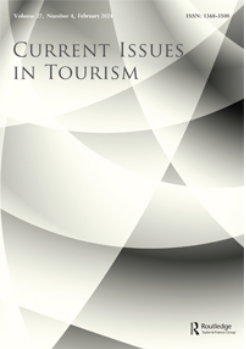Developing a scale for tourism literacy: validity and reliability study
IF 4.6
3区 管理学
Q1 HOSPITALITY, LEISURE, SPORT & TOURISM
引用次数: 0
Abstract
ABSTRACTTourism literacy encompasses the development and utilization of knowledge and skills within the tourism. These skills encompass problem-solving for various stakeholders, including managers, employees, tourists, and residents. Furthermore, they involve a deeper understanding of tourist destinations and active contributions to sustainable tourism promotion. Surprisingly, despite the extensive literature on literacy studies in fields like economics, media, maps, and water, there remains a conspicuous gap in tourism literacy research. Consequently, the novelty of this subject has spurred researchers to address this void. Accordingly, the main aim of this study is to develop a scale that can measure individuals’ tourism literacy, which will be the first of its kind. To achieve this, firstly a question pool was created. Then the scale was developed with expert opinions and pilot testing. CFA and EFA were performed for determining the final version of the scale. At the end of the study, a scale consisting of six dimensions (residents’ knowledge and skills related to tourism, tourists’ knowledge and skills, tourist guidance knowledge and skills, food and beverage management knowledge and skills, tourism management knowledge, and tourism management skills) was established, and its validity and reliability were confirmed. Future research suggestions and study limitations have been mentioned.KEYWORDS: Tourism literacyliteracyscale developmentknowledgeskill Disclosure statementNo potential conflict of interest was reported by the author(s).旅游素养量表的编制:效度与信度研究
摘要旅游素养包括旅游知识和技能的开发和利用。这些技能包括解决各种利益相关者的问题,包括经理、员工、游客和居民。此外,它们还涉及对旅游目的地的深入了解和对可持续旅游推广的积极贡献。令人惊讶的是,尽管在经济、媒体、地图和水等领域有大量关于扫盲研究的文献,但在旅游扫盲研究方面仍然存在明显的差距。因此,这一学科的新颖性促使研究人员去解决这一空白。因此,本研究的主要目的是开发一个可以衡量个人旅游素养的量表,这将是同类量表中的第一个。为此,首先创建了一个问题池。然后在专家意见和试点测试的基础上编制量表。采用CFA和EFA来确定量表的最终版本。研究结束时,建立了由居民旅游相关知识技能、游客旅游相关知识技能、导游知识技能、餐饮管理知识技能、旅游管理知识技能、旅游管理技能六个维度组成的量表,并对其效度和信度进行了验证。提出了今后的研究建议和研究的局限性。关键词:旅游文化文化规模发展知识技能披露声明作者未报告潜在的利益冲突。
本文章由计算机程序翻译,如有差异,请以英文原文为准。
求助全文
约1分钟内获得全文
求助全文
来源期刊

Current Issues in Tourism
HOSPITALITY, LEISURE, SPORT & TOURISM-
CiteScore
15.50
自引率
10.00%
发文量
230
期刊介绍:
Journal metrics are valuable for readers and authors in selecting a publication venue. However, it's crucial to understand that relying on any single metric provides only a partial perspective on a journal's quality and impact. Recognizing the limitations of each metric is essential, and they should never be considered in isolation. Instead, metrics should complement qualitative reviews, serving as a supportive tool rather than a replacement. This approach ensures a more comprehensive evaluation of a journal's overall quality and significance, as exemplified in Current Issues in Tourism.
 求助内容:
求助内容: 应助结果提醒方式:
应助结果提醒方式:


